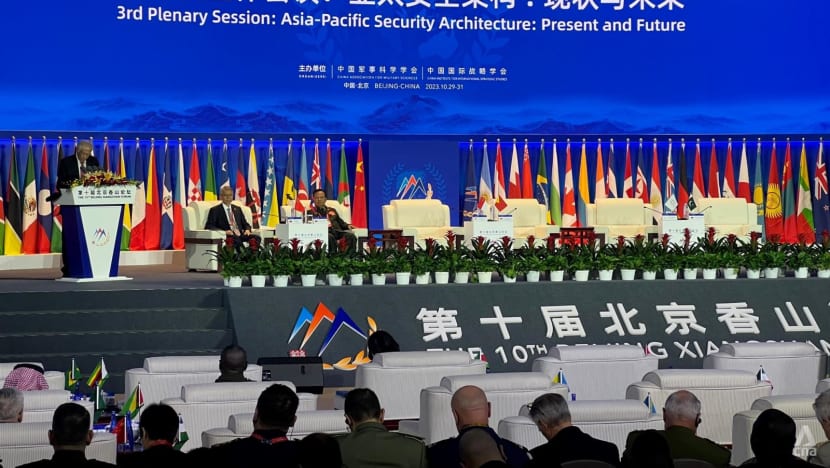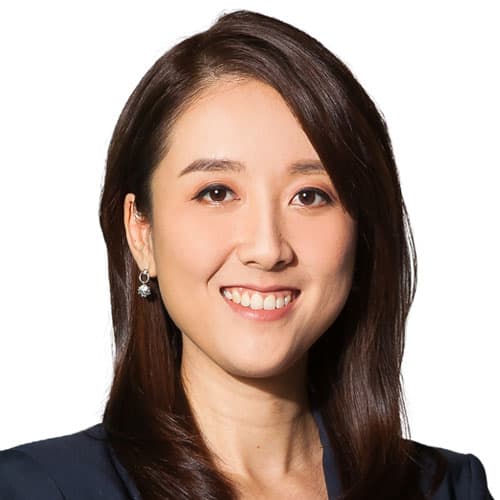Beijing Xiangshan Forum: China to host annual show of military diplomacy this week
Chinese officials said the forum is set to discuss a range of global challenges including artificial intelligence, regional conflicts and security in outer space.


This audio is generated by an AI tool.
BEIJING: China is gearing up to host its annual show of military diplomacy this week.
State media said defence officials from more than 90 countries and international organisations have confirmed their participation at the Beijing Xiangshan Forum from Thursday (Sep 12) to Saturday.
Chinese officials said the forum is set to discuss a range of global challenges, with topics such as artificial intelligence, ongoing regional conflicts and security in outer space on the agenda.
The United States is expected to send Michael Chase, its deputy assistant secretary of defence for China, Taiwan and Mongolia, to Xiangshan, according to Reuters.
Citing an unnamed US official, the news agency said the senior Pentagon official’s expected attendance sends a message that the US prioritises engagement at the military level with China.
While that points to signs of thawing defence ties, breakthroughs in the differences between the two countries on many major issues will be unlikely, said analysts.
CHINA EYES MEDIATOR ROLE
The theme of the 11th edition of the forum “promoting peace for a shared future”, is an indication of what China aims to achieve with the annual security meeting.
“China has … in more recent years, sought to play a mediator role. That’s a tool in China’s foreign policy portfolio and we can expect this to continue,” said Lye Liang Fook, a senior fellow at the ISEAS-Yusof Ishak Institute in Singapore.
“Certainly, for China to play such a role, it’s to be welcomed. The challenge is in finding solutions, after bringing the different parties onboard, that can lead to more durable outcome,” added Lye, whose research interests cover China’s foreign policy.
The forum takes place less than two months after China hosted a series of high-profile diplomatic meetings with parties in the Russia-Ukraine war as well as the conflict between Israel and Hamas.
However, the desire to be a mediator comes amid its own disputes with countries closer to home.
Frequent clashes between Chinese and Philippine vessels in the disputed South China Sea have made international headlines on a near daily basis in recent months, with Beijing and Manila blaming each other for provocative actions at sea.
With tensions running high, analysts said it is timely for countries to use the Xiangshan forum as a platform to manage differences and find a way forward.
“It’s important for China and the Philippines to try to work something out away from the media glare, rather than play to the gallery,” said Lye.
“The forum will provide an avenue not only for the claimant states, but for other countries to get a better sense of each country’s position on this issue … (which) is not new but certainly there could be some nuances that could be gleaned.”
CHINA-US TIES
Victor Gao, chair professor at China’s Soochow University, said China-US relations are at the lowest point since ties were normalised in 1979.
He noted that in-person communication through regional forums such as Xiangshan is critical, given both countries’ frequent clashes over a slew of issues.
He said the forum is a good space for the voices of major countries to be aired and heard, but added the US needs to “walk the right walk” on issues such as the “One China” policy.
“This (also) applies to staying away from directly intervening in territorial disputes between China and the Philippines … and don't even try to bind India onto the bandwagon of the US in its geopolitical rivalry against China,” he said.
However, analysts said any meaningful shifts in positions on both sides will be unlikely, especially as the US heads to the polls in November to elect a new president.
THE XIANGSHAN FORUM
The China-hosted gathering has seen its prominence grow in recent years amid simmering rivalry between the two superpowers.
The forum started with just 14 countries in its first iteration in 2006. It grew to more than 70 in 2018, and half a decade later today, the number of participating countries and international organisations stands at more than 90.
This year’s edition is set to be its biggest.
Ian Chong, an associate professor of political science at National University of Singapore, noted that the forum was “one among the many” in the past.
“Now, given that there’s been reduced contact between (China) and in particular, the US and some of its allies, it has become one of the few available conduits for some level of exchange to happen,” he added.
Chinese Defence Minister Dong Jun is expected to host more than 500 representatives and deliver a speech at the event.
The forum is returning for a second year after a three-year hiatus over the COVID-19 pandemic. Last year, China held the event in the absence of a defence minister following the sacking of Dong’s predecessor Li Shangfu.
CHINA’S ANSWER TO SHANGRI-LA DIALOGUE?
Since 2015, the Xiangshan forum has become a yearly affair.
It is styled as China’s answer to the Shangri-La Dialogue, Asia’s premier security gathering in Singapore.
Scheduled months after the Singapore dialogue that typically happens around June, it has been seen as a platform for China to respond to views aired during the Shangri-la Dialogue – which China continues to criticise as being westernised.
“At the Shangri-La Dialogue, (China) criticises as much as it receives criticism. China would prefer a more managed environment like the Xiangshan forum which allows them to put their point across,” said Chong.
The US typically sends a lower-level delegation to the Xiangshan forum, compared with the Singapore dialogue which is usually represented by its defence chief.
This year, Chase’s expected attendance takes place after China's Dong met US Secretary of Defense Lloyd Austin in Singapore in June, amid signs of thawing military ties.
“Exactly a year ago, there was no military-to-military communication between the US and China,” said Yun Sun, co-director of the East Asia Program at the DC-based think tank Stimson Center.
“But now, these communications have been resumed or re-established. I would be very curious to see what the US-China interaction will look like, and what China’s position will be on this particular issue at the Xiangshan forum.”
Last year, the US sent a delegation led by Xanthi Carras, its China country director in the Office of Undersecretary of Defense.
Other Western countries have either shunned or sent small and low-level delegations.
However, the forum will feature many representatives from the Global South, which China has been focusing its outreach on.
Most recently, the forum even gave rare but prominent billing to Russia, which has received international scrutiny for its invasion of Ukraine.















